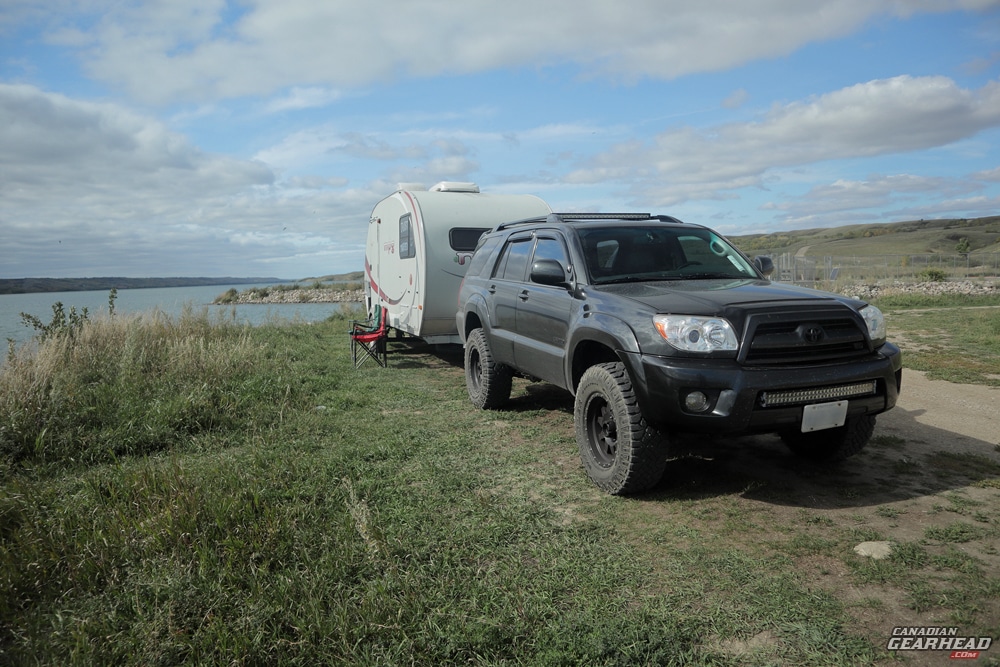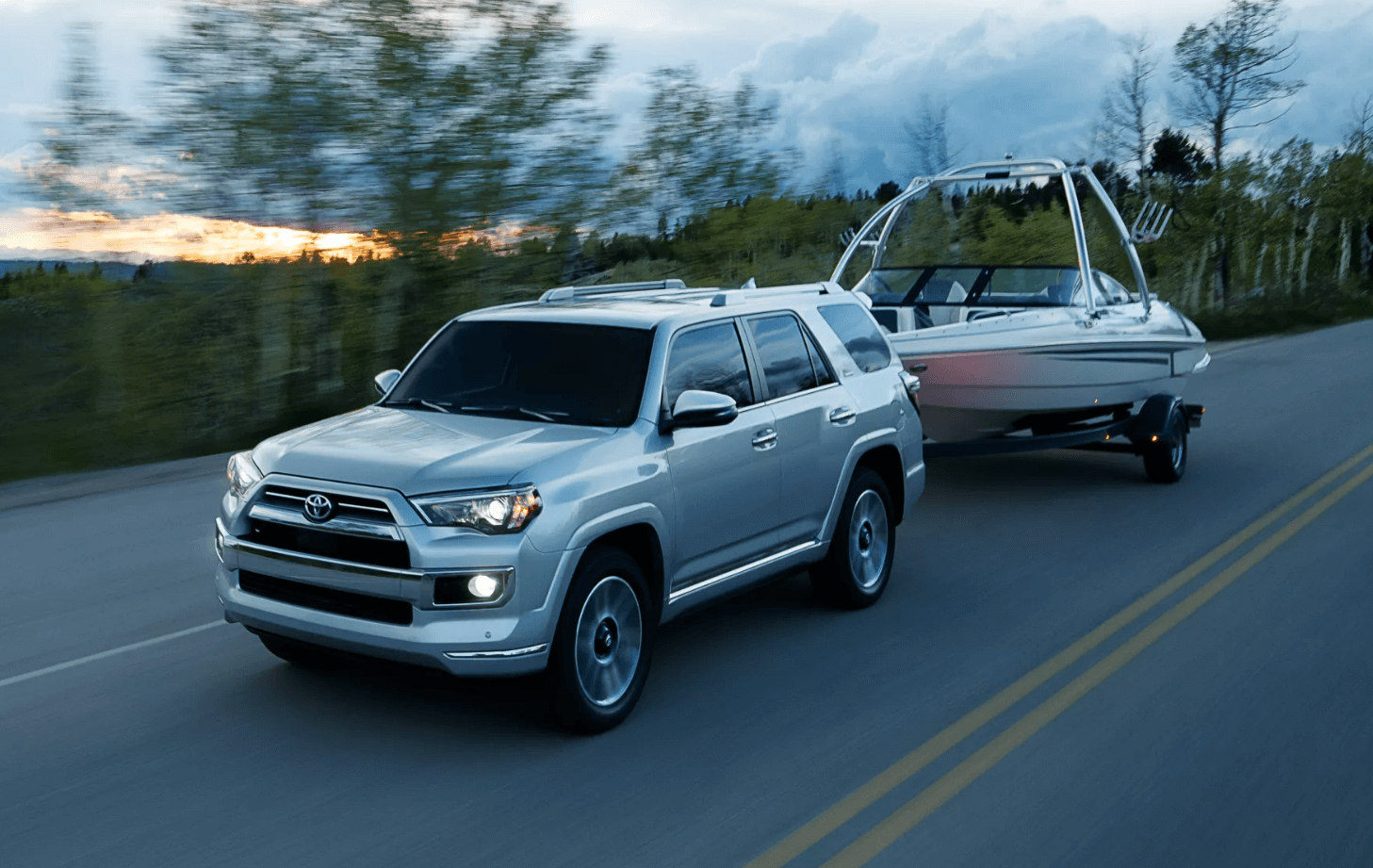Towing with a Toyota 4Runner: A Comprehensive Guide
Related Articles: Towing with a Toyota 4Runner: A Comprehensive Guide
Introduction
With great pleasure, we will explore the intriguing topic related to Towing with a Toyota 4Runner: A Comprehensive Guide. Let’s weave interesting information and offer fresh perspectives to the readers.
Table of Content
- 1 Related Articles: Towing with a Toyota 4Runner: A Comprehensive Guide
- 2 Introduction
- 3 Towing with a Toyota 4Runner: A Comprehensive Guide
- 3.1 Towing Capacity and Limitations
- 3.2 Understanding Towing Equipment
- 3.3 Towing Techniques and Considerations
- 3.4 The Importance of Trailer Maintenance
- 3.5 FAQs about Towing with a 4Runner
- 3.6 Tips for Towing with a 4Runner
- 3.7 Conclusion
- 4 Closure
Towing with a Toyota 4Runner: A Comprehensive Guide

The Toyota 4Runner, renowned for its robust build and off-road capability, is a popular choice for those who seek adventure and practicality. Its versatility extends beyond its rugged exterior, encompassing the ability to tow various types of trailers. Understanding the intricacies of towing with a 4Runner, however, is crucial to ensure a safe and enjoyable experience. This comprehensive guide delves into the nuances of towing with a 4Runner, covering aspects ranging from its towing capacity to essential safety considerations.
Towing Capacity and Limitations
The 4Runner’s towing capacity varies depending on the model year and engine configuration. Generally, the 4Runner boasts a towing capacity ranging from 5,000 to 7,000 pounds. However, it’s vital to consult the owner’s manual for the specific towing capacity of your particular 4Runner. Exceeding the vehicle’s recommended towing capacity can lead to serious consequences, including damage to the vehicle, compromised handling, and increased risk of accidents.
Factors such as trailer weight distribution, terrain, and weather conditions can significantly influence the actual towing capacity. It’s essential to factor in these variables and ensure the total weight of the trailer, cargo, and occupants remains well below the vehicle’s maximum towing capacity.
Understanding Towing Equipment
Properly equipped towing equipment is paramount for safe and efficient towing. Essential components include:
- Trailer Hitch: The trailer hitch serves as the connection point between the vehicle and the trailer. Choosing the right hitch size and type is crucial, ensuring compatibility with the trailer and the vehicle’s towing capacity.
- Safety Chains: Safety chains are essential for preventing the trailer from detaching from the vehicle in case of hitch failure. They should be properly connected to both the trailer and the vehicle, ensuring they are taut but not overly tight.
- Trailer Brakes: Depending on the trailer’s weight and the towing conditions, trailer brakes may be required. Electric brakes, controlled by the vehicle, offer greater stopping power and control, particularly for heavier trailers.
- Trailer Lights: Proper trailer lighting is essential for visibility and safety. Ensure all lights, including taillights, brake lights, and turn signals, are functioning correctly and are visible to other vehicles.
- Weight Distribution Hitch: For heavier trailers, a weight distribution hitch helps to distribute the trailer’s weight evenly across the vehicle’s axles. This improves stability, handling, and reduces stress on the vehicle’s suspension.
Towing Techniques and Considerations
Towing with a 4Runner requires specific techniques and considerations to ensure a safe and comfortable journey:
- Proper Weight Distribution: Ensure the trailer’s weight is evenly distributed. This minimizes sway and improves handling, particularly on winding roads.
- Slow and Steady: Maintain a slower speed than usual, especially when towing. This allows for greater control and reduces the risk of accidents.
- Anticipate Braking: Leave ample space between your vehicle and other vehicles, allowing for longer braking distances.
- Minimize Sharp Turns: Avoid sharp turns, especially at higher speeds. This minimizes trailer sway and reduces stress on the vehicle’s suspension.
- Regular Maintenance: Regular maintenance is crucial, particularly for the brakes, tires, and suspension components.
- Be Aware of Your Surroundings: Pay extra attention to your surroundings, including road conditions, traffic, and weather.
The Importance of Trailer Maintenance
While the 4Runner is designed to handle towing, it’s equally important to ensure the trailer is in optimal condition. Regular maintenance includes:
- Tire Pressure: Maintain proper tire pressure in the trailer tires.
- Wheel Bearings: Inspect and lubricate wheel bearings regularly to prevent premature wear and failure.
- Lights: Ensure all trailer lights are functioning correctly.
- Brakes: Inspect and adjust trailer brakes as needed to maintain optimal braking performance.
- Overall Condition: Check for any damage, wear, or loose connections that could compromise safety.
FAQs about Towing with a 4Runner
Q: What is the maximum towing capacity of a 4Runner?
A: The towing capacity of a 4Runner varies depending on the model year and engine configuration. Consult your owner’s manual for the specific towing capacity of your vehicle.
Q: What type of trailer hitch should I use with a 4Runner?
A: The appropriate trailer hitch type depends on the trailer’s weight and the vehicle’s towing capacity. Consult with a qualified professional to determine the best hitch for your specific needs.
Q: Do I need trailer brakes when towing with a 4Runner?
A: Whether or not trailer brakes are required depends on the trailer’s weight and towing conditions. Consult your owner’s manual and local regulations for guidance.
Q: How do I properly distribute the weight of the trailer?
A: Proper weight distribution involves ensuring the trailer’s weight is evenly distributed across the vehicle’s axles. This can be achieved by positioning cargo correctly and using a weight distribution hitch for heavier trailers.
Q: What are some safety tips for towing with a 4Runner?
A: Safety tips for towing include:
- Maintaining a slower speed than usual.
- Leaving ample space between your vehicle and other vehicles.
- Avoiding sharp turns, especially at higher speeds.
- Regularly inspecting and maintaining the vehicle and trailer.
- Being aware of your surroundings and weather conditions.
Tips for Towing with a 4Runner
- Practice in a Safe Environment: Practice towing in a safe and controlled environment before embarking on long journeys.
- Learn About Trailer Sway: Understand the causes and prevention of trailer sway.
- Consider a Towing Course: Enroll in a towing course to gain valuable knowledge and skills.
- Use a Trailer Brake Controller: Invest in a trailer brake controller for enhanced braking control.
- Maintain a Safe Distance: Keep a safe distance between your vehicle and other vehicles, especially when towing.
Conclusion
Towing with a 4Runner can be an enjoyable and rewarding experience, allowing you to explore new adventures and transport your belongings with ease. However, understanding the vehicle’s capabilities, utilizing proper equipment, and adhering to safe towing practices are paramount. By following the guidelines outlined in this guide, you can enhance your towing experience, ensuring a safe and enjoyable journey for you and your passengers. Remember, towing is a serious endeavor, and prioritizing safety should always be your top concern.








Closure
Thus, we hope this article has provided valuable insights into Towing with a Toyota 4Runner: A Comprehensive Guide. We hope you find this article informative and beneficial. See you in our next article!